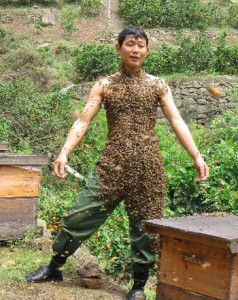
Last week, some jerkwad bee just up and stung (stang?) me for no reason. It was slightly less than awesome.
I plead my case before the gods of bees and justice that I had done nothing to this bee. And yet, I incurred his wrath. I had attempted to steal no honey. I had not even had any honey in months, because I use honey to sweeten hot tea, and it hadn’t been cold. But I comfort my bruised sense of justice and still-kind-of-itchy forearm with the thought that this is insect karma: I’ve used ant traps. Swatted mosquitoes. Told spiders I’d prefer if they left.
I also told myself that at least now I know I am not allergic to bee stings. Because, despite getting stanged, I did not at all die. Like, not at all!
But I’m told that I need at least one more bee to stick it in me before I can be sure about this. That the first one’s just practice (really, just to sensitize you.) So, NEXT TIME, I might die. This sounded like possible BS from Big Bee, meant to sell us more bee stings we don’t really need. So I decided to investigate:
I went out and picked a fight with a beehive.
Just kidding, I Googled it. Most of the major medical sites don’t talk about needing a first sting, but this article that is overrun with pop-up ads has an MD quote that does: “Most people must be stung at least once before having an allergic reaction the second time around. You have to have that initial exposure that sensitizes you to the venom.”
So, it’s possible I’ve simply been set up for my eventual face-balooning death.
Reputable website MayoClinic.com tells me, however, that only 3 percent of people who suffer insect stings will experience the severe allergic reaction known as anaphylaxis.
And this is not to say that everyone must necessarily experience an uneventful first stinging before succumbing to bee-ish wrath the second time. Again, from Mayo, “People who have a severe allergic reaction to a bee sting have a 30 to 60 percent chance of anaphylaxis the next time they’re stung.” So my lack of a severe reaction the first time out at least means I’m less likely to go down come round two.
However, contrary to the image of bee-sting vulnerability you may have from “My Girl,” adults face a greater risk than children, even those representing the innocence of long-lost days in coming-of-age stories. From Mayo: “Adults tend to have more-severe reactions than children and are more likely to die of anaphylaxis than are children. ”
So, in conclusion, my chances of death at the hands (or abdomens) of bees will only increase. I’ll be sure to let you know if I die. But winter is coming, so the little striped marauders will soon freeze. That gives me another good 6-8 months to live. Let’s make it count. I’m buying a sled.

